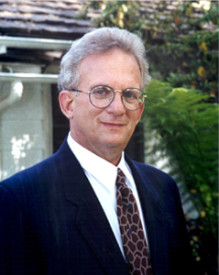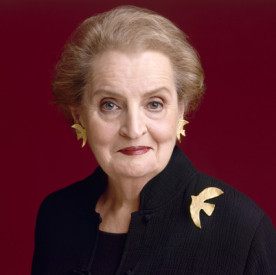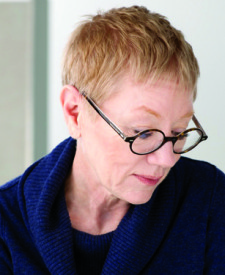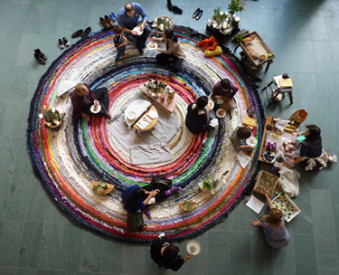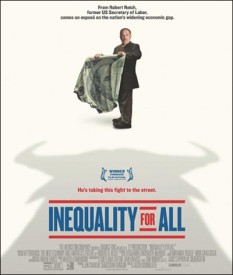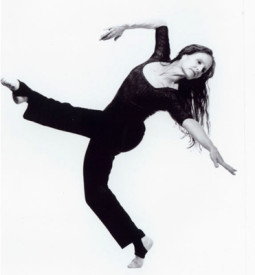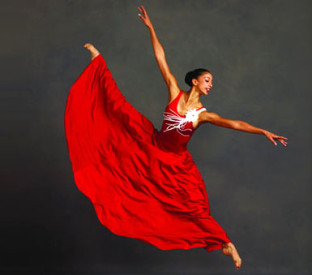Spring 2014 coming attractions: legacies of war, collaborative art, Cal Day and robots with heart
The gamut of events offered at UC Berkeley is a perennial feast for hungry minds, and this semester’s lineup is no exception.

January 28, 2014
The gamut of events offered at UC Berkeley is a perennial feast for hungry minds, and this semester’s lineup is no exception. Appetites for knowledge and experience can be fed with everything from a discussion on foreign policy with Madeleine Albright, to a hands-on collaborative art exhibition, to a performance by the legendary Martha Graham Dance Company.
If any single day can offer a glimpse of the vast and creative life of Berkeley, Cal Day 2014 is it. On Saturday, April 12, the campus will throw open its doors and welcome more than 30,000 people — prospective students and their families, current students, staff, faculty, parents, alumni, friends and the just-plain-curious — to explore more than 300 events and demonstrations. (10 a.m.-4 p.m., campuswide)
Among other spring highlights are:
War-torn
The Vienna Philharmonic Orchestra returns to Berkeley for a residency in March. As the world commemorates the 100th anniversary of the outbreak of World War I, the Philharmonic offers a symposium on the intermingling of art and politics in Vienna at that time. Events are free and open to the public (Saturday, March 8, 10 a.m.-1 p.m. and 2-4 p.m; Sunday, March 9, 11 a.m.-2 p.m., Berkeley Art Museum, Gund Theater). Performances include three programs with music by Schubert, Mahler, Haydn, Brahms, Mozart, Staud and Bruckner (Friday & Saturday, Mar. 7 & 8, 8 p.m; Sunday, Mar. 9, 3 p.m., Zellerbach Hall). A master class with the UC Symphony Orchestra is free and open to observers. (Saturday, March 8, Hertz Hall)
Art Under the Gun, which reflects life in a conflict zone, features Iraqi-born artist Wafaa Bilal, who fled Iraq in 1991 during the first Gulf War. After spending two years in refugee camps in Kuwait and Saudi Arabia, he came to the United States to study at the School of Art Institute of Chicago. Bilal will discuss his performance art projects and his experiences in conflict zones. (Monday, Apr. 7, 7:30 p.m., 160 Kroeber Hall)
Saved By the Bay, a special program and exhibit, recounts the story of 70 scholars who escaped fascist Europe during World War II and helped shape the University of California’s academic direction. The opening ceremony will include remarks by UC President Janet Napolitano. (Wednesday, Jan. 29, 5:30 p.m., The Magnes Collection of Jewish Art and Life, 2121 Allston Way; exhibit runs through June 27)
After The War Blues, a play by the acclaimed Philip Kan Gotanda, tells the story of jazz trumpeter Chet Monkawa, just returned to his family’s rooming house after his internment in a World War II prison camp. Gotanda’s words pay tribute to San Francisco and the cultural shifts following the war. (March 7-16, 8 p.m. Fridays & Saturdays, 2 p.m. Sundays, Zellerbach Playhouse)
Chilean photographer Paz Errazuriz presents two series of photographs of people living on the margins of society under the dictatorship of Augusto Pinochet. The two series, La manzana de Adan (Adam’s Apple) and Boxeadores (Boxers) will be on display at the Berkeley Art Museum. (Jan. 17-Aug. 31, Wed.-Sun., 11 a.m.-5 p.m.)
The Kronos Quartet returns to Berkeley with the world premiere of Beyond Zero: 1914-1918, a new multimedia work with composer Aleksandra Vrebalov and filmmaker Bill Morrison commemorating the centennial of the outbreak of World War I. (Sunday, Apr. 6, 7 p.m., Hertz Hall) The residency includes a symposium, “A Meditation on War” with David Harrington of The Kronos Quartet, composer Aleksandra Vrebalov, documentary filmmaker Bill Harrison, and Thomas Laqueur, of UC Berkeley’s department of history. (Friday, Apr. 4, 2-5 p.m., The Magnes Center, 2121 Allston Way, Berkeley. Free and open to the public)
Present politics
Author and experimental psychologist Steven Pinker asserts that violence has been in decline in the world and that people may be living in the most peaceful era of human existence in his talk on his book The Better Angels of Our Nature. (Tuesday, Feb. 4, 4:10 pm, International House, Chevron Auditorium)
The conference Israeli and Palestinian Waterways seeks to further water and environmental scholarship by engaging with key water issues in Israel and the Palestinian territories and examining the power of water to shape their sociopolitical landscapes. (Tuesday, Mar. 11, Boalt School of Law)
Howard Berman, who retired from Congress last year after 30 years, will pull from his years of experience in international relations to examine the state of Iran and nuclear weapons. (Wednesday, Apr. 9, 7:30 p.m., Sutardja Dai Hall, Banatao Auditorium)
Nigel Crisp, independent crossbench member of Britain’s House of Lords, working on international development and global health, will discuss the three most promising areas for innovation in global health in Triple Aim, Triple Gain. (Wednesday, Feb. 19, 4 p.m, 150 University Hall)
Journalist, playwright and novelist George Packer will discuss the rise of economic inequality, which he explores in his book The Unwinding: An Inner History of the New America. (Wednesday, Mar. 19, 4 p.m., Sutardja Dai Hall, Banatao Auditorium)
TEDxBerkeley gathers thinkers, makers and doers to “Rethink. Redefine. Recreate.” The event will combine presentations, discussions, entertainment and art intended to spark new ideas and opportunities. (Saturday, Feb. 8, 10 a.m-5 p.m, Zellerbach Hall)
Pulitzer-prize winning author of Guns, Germs and Steel, Jared Diamond, will discuss how traditional peoples differ from members of modern industrial societies in their reactions to danger in “The World Until Yesterday.” (Wednesday, Apr. 30, 7-8:30 p.m.)
Governing In The Information age
Statistician Nate Silver, best-known for his well-targeted political predictions, will talk about his methods, how he calculates outcomes and what he sees on the horizon for statistical analysis. (Sunday, May 4, 3 p.m, Zellerbach Hall)
Following up on a call for citizen feedback to lawmakers, California Lt. Gov. Gavin Newsom and Berkeley professor Ken Goldberg will discuss the results of a new online platform intended to increase public engagement in “Making The Grade.” (March 20, 2 p.m., Sutardja Dai Hall, Banatao Auditorium)
Berkeley professor and former Michigan Gov. Jennifer Granholm will moderate a conversation with former U.S. Secretary of State Madeleine Albright about enabling democracy by using novel technology, and the implications for foreign policy. (Thursday, Jan. 30, 4:30 p.m., Sutardja Dai Hall, Banatao Auditorium)
Ecology and global politics
Dan Kammen, professor in the Energy and Resources Group and the Goldman School of Public Policy, will lead a discussion with ERG graduate students about managing energy and resources in emerging Latin American economies. (Monday, Feb. 10, noon, 370 Dwinelle Hall)
In Pacific Rim or Pacific Garbage Patch: The Ocean and Ecological Crisis, author and environmental activist Wu Ming-yi, ocean researcher Eric Hartge and law and history professor emeritus Harry Scheiber will discuss the health of the ocean, impending acidification, international laws and climate-mitigation goals. (Wednesday, Feb. 26, 4 p.m., IEAS conference room, 2223 Fulton Street, 6th floor)
Science
Robots and New Media is a two-day conference to discuss robots as an emerging medium. Recent trends have given rise to social and emotional robotic platforms, which provoke legal and ethical dilemmas. Panelists will discuss their uses and possibilities. (Friday-Saturday, Apr. 4-5, Sutardja Dai Hall, Banatao Auditorium).
In How Can Telomeres Cause Age-Related Disease, 2009 Nobel Prize winner Carol Greider, will discuss telomeres and their role in human disease. Greider, professor of molecular biology and genetics at Johns Hopkins University, researched telomeres and discovered telomerase at UC Berkeley in 1984 and won her Nobel for that work. (Tuesday, Mar. 4, 4:10 p.m, International House, Chevron Auditorium)
Author and journalist Chris Mooney will join a panel discussion on science journalism with faculty from the Graduate School of Journalism and the department of Environmental Science, Policy and Management. Mooney’s books include Unscientific America and The Republican Brain: The Science of Why They Deny Science and Reality. (Wednesday, Apr. 2, 2014, International House, Chevron Auditorium)
Readings
A new lunchtime event, Berkeley Book Chats, celebrates the intellectual and artistic endeavors of UC Berkeley faculty, who will present a recent publication, performance or recording. Art history professor Whitney Davis will discuss A General Theory of Visual Culture, and French professor Debarati Sanyal will speak on Dangerous Intersections: Complicity, Trauma and Holocaust Memory. (Respectively, Wednesday, Feb. 19, and Wednesday, Mar. 5, noon, Townsend Center, Geballe Room)
New York Times best-selling author Ayelet Waldman will read from her new novel, Love and Treasure in the library’s Story Hour. Previous books include Red Hook Road and Bad Mother: A Chronicle of Maternal Crimes, Minor Calamities and Occasional Moments of Grace. Waldman’s personal essays, profiles and commentaries have appeared in the New York Times, Vogue and the Washington Post. (Thursday, Apr. 10, 5 p.m., Doe Library, Morrison Library)
Poet Linda Gregerson will read her work as part of the ongoing series Lunch Poems. Gregerson is the author of five books of poetry and two of literary criticism. Her many honors include awards from the American Academy of Arts & Letters, The National Endowment for the Arts and the Guggenheim, Rockefeller, and Mellon Foundations. (Thursday, Feb. 6, 12:10 p.m, Doe Library, Morrison Library)
Visual Expression
The Possible is an experimental exhibition that reconceives the Berkeley Art Museum as a site for creative convergence. The exhibition combines studio, classroom, library, gallery and stage. A multisensory library provides context and inspiration, while the galleries are reconfigured as workspaces. Collaborating with one another and the public, guest artists will use these studios to create new work in a public forum. The finished works will filter into a gallery installation, building the exhibition over time. (Jan. 29-May 25, Wed.-Sun., 11 a.m.-5 p.m., Berkeley Art Museum)
Plants become art at the Botanical Garden’s Fiber & Dye exhibition. From traditional uses to innovation in eco-fashion, the exhibit illuminates the connection between culture and nature, and gives insight into the science of color in nature. (Mar. 6-23, 10 a.m.- 4 p.m daily, UC Botanical Garden)
Street photographer Vivian Maier’s work was discovered at an auction in Chicago following her death. Posthumously, she has become a sensation, having captured thousands of spontaneous portraits and urban scenes from the 1950s to the ’90s. Her photos appear in the exhibit “A Tribute to Newspapers.” (Feb. 3-May 1, Graduate School of Journalism, North Gate Hall, Reva & David Logan Gallery)
Film
Economist and professor Robert Reich and film director Jacob Kornbluth will present a screening and discussion of Inequality for All, a documentary that follows former U.S. Labor Secretary Reich as he raises awareness of the widening economic gap in the United States. (Wednesday, Feb. 5, 7 p.m., Wheeler Auditorium)
The Center for Latin American Studies presents Gold Fever, a hard-hitting documentary that follows three indigenous women as they resist a gold-mining operation that threatens their ancestral lands and people. (Wednesday, February 26, 7:00 pm, Valley Life Sciences Building, Room 2060) CLAS also presents a screening of Mexico’s highest-grossing film ever, We Are the Nobles, a farcical tale of a self-made man who schemes to convince his spoiled, 20-something children that all the money is lost. (Wednesday, Mar. 12, 7 p.m., Valley Life Sciences Building, Room 2060)
The Pacific Film Archive begins a year-long retrospective of innovative French filmmaker Jean-Luc Godard. His work employs an inspired use of elliptical structure, jump cuts, extreme close-ups and Brechtian techniques. Contempt stars Brigitte Bardot, Michel Piccoli, Jack Palance and Fritz Lang in a story about a man against circumstance, namely, shooting a film in Italy. (Saturday, Feb. 15, 8:20 p.m) Weekend satirically depicts the horrors of bourgeois ideology in a spectacle of Parisians fighting for their weekend leisure. (Saturday, Apr. 19, 8:30 p.m)
Dance
The iconic Martha Graham Dance Company returns to Berkeley with a program of signature works. Graham dug deep into the American psyche to define contemporary dance that would influence generations. The program includes Appalachian Spring, Cave of the Heart and Maple Leaf Rag. (Friday & Saturday, Jan. 31 and Feb. 1, 8 p.m., Zellerbach Hall) Marni Wood Thomas, director emerita of the Martha Graham School of Contemporary Dance, discusses her life’s work and the intricacy of Graham’s technique. (Friday, Jan. 31, 6 p.m, Durham Studio Theater)
Alvin Ailey Dance Theater returns to Berkeley for a residency in April with two Bay Area premieres and a longtime favorite, Revelations (Tuesday-Friday, Apr. 1-4, 8 p.m; Saturday, Apr. 5, 2 and 8 p.m.; Sunday, April 6, 3 p.m., Zellerbach Hall)
The Mark Morris Dance Group also will be in residency in April. Along with the Philharmonia Baroque Orchestra, the company will present the world premiere of Acis and Galatea, featuring music by Handel and original choreography by Mark Morris. (Friday-Saturday, Apr. 25-26, 8 p.m.; Sunday, Apr. 27, 3 p.m., Zellerbach Hall).
Turf Battle, featuring The Mekanix, is an all-style dance tournament featuring the best of Bay Area turf dancing. The Mekanix, Oakland godfathers of hip-hop production, join a week-long residency with “The Possible” exhibition. The night ends with an all-out dance-off. (Friday, Mar. 7, 7:30 pm, Berkeley Art Museum, Studio B)
Music
Experimental composer and sound artist Joan La Barbara presents her innovative “Voice Piece,” a piece based on a rigorous process of circular singing and split-tone multiphonics. (Friday, Mar. 14, 7:30 pm, Berkeley Art Museum, Studio B)
Bay Area bandleader and bassist Marcus Shelby leads the Marcus Shelby Orchestra in a celebration of Duke Ellington’s swing music. (Friday, May 2, 8 p.m., Zellerbach Hall)
Family events
The Pac-12 Women’s Gymnastics Championships return to Berkeley for the first time since 2005. The event brings some of the best teams in the country, all ranked in the nation’s top 25, as they compete for gold. (Saturday, Mar. 22, Haas Pavilion)
Portuguese Youth Day, including a festival of folkloric dance, introduces high school Portuguese clubs from throughout the state to higher education opportunities at Berkeley. (Thursday, Apr. 24, noon, Sproul Plaza and steps).
The Lawrence Hall of Science invites visitors to “meet the makers” at the Fixit Clinic. Free family admission is yours if you bring a broken electronic device, appliance or computer to be disassembled and possibly repaired. (Saturday, Feb. 8, 12:30-3:30 p.m.) Families can also celebrate Earth Day at DeBUG, where kids and their parents can engineer their own insect robots, cook up edible creepy-crawler snacks and discover inventions that will attract garden pollinators. (Saturday, Apr. 19, 10 a.m-2 p.m.).
Where times are not listed, they were not yet available.
UC Berkeley’s Critic’s Choice calendar carries a full list of events.
